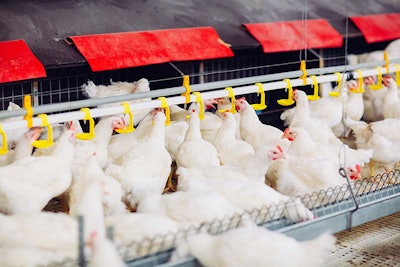
Sprinkler technology can offer broiler producers a way to conserve water and improve feed conversion ratios efficiently and sustainably, while also preventing heat stress, according to research from the Arkansas Agricultural Experiment Station, the research arm of the University of Arkansas System Division of Agriculture
“This is a very efficient way to cool chicken in comparison to the widely popular cool cell evaporative system,” Yi Liang, associate professor of biological and agricultural engineering and faculty with the Center of Excellence for Poultry Science within the University of Arkansas System Division of Agriculture, said.
“The biggest benefit is that you can use less cooling water on the farms,” she added, noting that sprinklers can result in an average water savings of 67%.
“Embrace the sprinkler,” encouraged Walter Bottje, an experiment station poultry science physiologist. “The research shows that it works and it can really reduce the amount of water needed during the summer months.”
Artificial rain to cool the chicken, not the house
Low-pressure sprinkler technology, also known as surface wetting technology, relies on a water regulator to maintain pressure between 30 and 50 psi. Using nozzles spaced evenly through the house, the system creates artificial rain made of coarse water droplets that cools the surface of the chicken.
“The sprinkler does not attempt to cool the air inside the house,” Yi explained. “The house can stay fairly warm, but the birds receive water as needed.”
The sprinklers provide direct cooling for the birds through intermittent spray. A temperature sensor in the poultry house controls the frequency (typically between 10 and 30 minutes) and the duration of each spray (typically between 20 and 40 seconds).
Benefits of sprinklers to poultry
Exposure to a combination of high heat and high humidity can cause heat stress, leading to increased morbidity and mortality. When chickens experience heat stress, the first thing that happens is a reduction in feed intake and an increase in corticosterone levels, a marker of stress.
In a test, the researchers found that broilers raised in houses with sprinklers showed lower corticosterone levels and better feed intake.
“It seems like the sprinklers alleviated the systemic and local stress by reducing plasma corticosterone levels and heat shock protein expression in internal organs such as gut and brain. This, in turn would preserve energy, as evidenced by down regulation of the energy sensor adenosine monophosphate protein kinase (AMPK).The preserved energy would be used for growth instead of repair the damage-caused by stress” explained experiment station poultry science professor Sami Dridi.


















